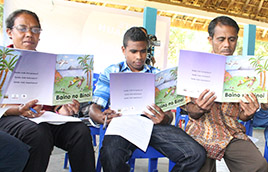Timor-Leste: Peace Houses used to raise awareness about corruption

Corruption has ongoing and lasting effects. It stifles economic and social development and contributes to governmental instability. It is a serious problem that effects all nations. 9 December is the International Anti-corruption Day that aims to raise awareness of corruption and its effects.
Corruption, collusion and nepotism has been identified as one of the main obstacles to lasting peace in Timor-Leste. Over 900 Timorese citizens were consulted by CEPAD on issues relating to peace. CEPAD is now working with local people, civil society and government representatives to develop solutions to the prevalent problem of corruption in the country. According to Transparency International's 2013 Corruption Perception Index released last week, public sector corruption in Timor-Leste has worsened from 33 out of 100 to 30 this year.
The Centre of Studies for Peace and Development (CEPAD), Interpeace's partner in Timor-Leste worked together with the FOTI Timor-Leste Programme to develop materials that are raising awareness of corruption and the problems it causes in Timorese society. On the occasion of the International Anti-corruption Day, CEPAD has taken their innovative anti-corruption education package on the road. They aim to raise awareness of corruption in the most rural areas of Timor-Leste.
The Peace Houses
The events are being held in CEPAD's Peace Houses. These are increasingly being used by communities for peaceful community dialogue and engagement. The Peace Houses, founded on the local tradition of nahe biti bot (rolling out the big mat) have become a powerful hub for peacebuilding activities. Thanks to this latest anti-corruption initiative the Peace Houses now also serve as centers where people can access anti-corruption materials.
A coalition against corruption
The events in the Peace Houses have been attended by participants of different groups of the communities such as civil society, school representatives, local leaders and religious figures. As stated passionately by CEPAD's district liaison officer: "For the poor majority in Timor-Leste, they think about what they will eat tomorrow. For people who have some money, they think about where they will eat tomorrow. For the people at the top, who have money and power, they think about who they will eat tomorrow."
Representatives from the Ministry of Education, civil society organizations working on corruption and the President of the National Youth Council attended the events. Sra. Flavia Martins, Chief of Staff of the Vice-Minister of Higher Education expressed her gratitude and support for CEPAD's ongoing efforts: "This package is a great reference for any library and will directly and indirectly assist people to understand the meaning of corruption. The Ministry of Education will support CEPAD's great work into the future."
The events included discussions of how the civic education materials can be used most effectively in local communities. The educational material includes a children's story book, a CD, a television programme, a documentary film, and a brochure on corruption. The campaign is centered on the repercussions of corruption and ways to eradicate it. Each product in the package features different Timorese voices and is made for different groups within Timorese society, including children.
Building support
Through this initiative, CEPAD is raising public awareness about the causes and consequences of corruption. In collaboration with the Group Promoting Change, CEPAD is working with prominent individuals to initiate reform in state institutions with regards to corruption. The President of the Group Promoting Change, Sr. Leovigildo Hornai stated: "What is important is the conscience and moral courage of every individual to say 'I cannot, I will not and I don't allow any opportunity to commit corruption.' It is our mentality, our courage, our determination and our responsibility that we must strengthen."
